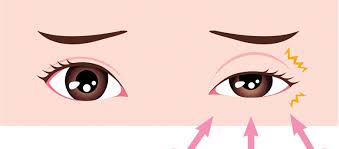Causes and treatment for irritating Eye twitching.
Myokymia, or twitching of the eyelids, can be brought on by dry eyes, eye irritation, eye strain, lack of sleep, or an excessive amount of caffeine. Eyelid spasms that are severe or persistent could be symptoms of various diseases.
Myokymia, often known as an eyelid twitch, is a recurrent, uncontrollable spasm of the eyelid muscles. Although it can happen in either the upper or lower lids, a twitch typically happens in the upper lid.

These spasms are typically minor and feel like a slight tugging on the eyelid. Some people may have a spasm that is severe enough to make both eyelids totally close. These spasms normally last for a minute or two and happen every few seconds.
Eyelid twitching episodes might happen at any time. It’s possible for the twitch to come and go for several days. After that, you might not twitch for several weeks or even months.
Although the twitches are usually mild and unharmful, you could find them annoying. Most spasms will go away on their own, rarely requiring medical intervention.
When they are accompanied by additional face twitches or uncontrollable movements, eyelid spasms can occasionally be a sign of a persistent movement problem.
Types of eyelid twitches
Three types of eyelid twitching can be distinguished:
- General eyelid spasm
- essential blepharospasm
- hemifacial spasm
General eyelid spasm
Eyelid spasms occasionally are deemed normal and don’t always signify a major issue. These twitches can be caused by a number of environmental causes and typically go away when you rest. You might want to discuss your symptoms with your doctor if these twitches persist and interfere with your daily activities.
Benign essential blepharospasm
You can have benign essential blepharospasm, which is the terminology for persistent and involuntary winking or blinking, if the spasms become chronic (long-term).
Usually affecting both eyes, this illness is more prevalent in women than in men. Up to 50,000 Americans may be affected by it, and it often appears in middle to late adulthood. Over time, the condition is likely to get worse and may lead to:
- hazy vision
- increased light sensitivity
- facial twitches
Hemifacial spasm
When only one eye is affected by the eyelid twitch, a hemifacial spasm may be present. This particular spasm is a neuromuscular problem that is typically brought on by a blood vessel placing too much pressure on a facial nerve.
In addition to being more prevalent in Asian people, this illness affects women more frequently than it does men. Untreated, it could result in:
- eye twitching that occurs often and without control
- not being able to open your eye
- your entire facial muscles on one side start to twitch.
What causes eyelid twitches?
There are many different reasons why eyelids could twitch. Talking to your doctor about this symptom could be helpful if it is causing you any trouble.
Eyelid twitching or spasms could be brought on by or aggravated by:
- corneal abrasion, eye strain, or irritation
- irritations caused by the environment, such as wind, bright lights, the sun, or air pollution
- weariness or little sleep
- physical effort or tension
- usage of coffee, cigarettes, or alcohol
- wet eyes
- adverse effects of medicine
- sensitivity to light
- Uveitis, or swelling of your eye’s middle layer
- Eyelid inflammation is known as blepharitis.
- Pinkeye, or conjunctivitis
- migraine attacks
Complications of eyelid twitches
Rarely are spasms of the eyelids a sign of a more severe brain or nerve problem. These more serious illnesses nearly typically come with other symptoms in addition to eyelid twitching.
The following brain and nerve conditions might produce eyelid twitches:
- Bell’s palsy, also known as facial palsy, is a disorder that makes one side of your face droop downward.
- Dytonia, which results in sporadic muscle spasms and twisting or contorting of the bodily part in question
- Due to cervical dystonia (spasmodic torticollis), your neck may occasionally spasm and your head may occasionally twist in an uncomfortable manner.
- Multiple sclerosis (MS), a condition of the central nervous system that impairs movement and cognition and produces exhaustion and eye twitching
- Parkinson’s disease, which can result in shaky limbs, rigid muscles, balance issues, and speech difficulties
- Involuntary movements and verbal tics are hallmarks of the Tourette syndrome.
Eye Twitching Treatment
The majority of mild twitches vanish on their own. Getting enough sleep and limiting coffee, alcohol, and tobacco use may be beneficial. Try over-the-counter artificial tears if your eyes are dry or irritated.
Benign essential blepharospasm cannot be cured. However, your physician can provide symptom relief. Botulinum toxin is the most widely utilised therapy (Botox, Dysport, Xeomin). Hemifacial spasms are also treated by it.
To reduce the spasms, your doctor will inject little quantities into your eye muscles. The effect gradually fades away after a few months. You’ll require multiple treatments.
Your doctor might recommend drugs such as:
- Clonazepam (Klonopin)
- Lorazepam (Ativan)
- Hydrochloride of trichexyphenidyl (Artane, Trihexane, Tritane)
These typically provide only transient comfort.
Alternative therapies consist of:
- Biofeedback
- Acupuncture
- Hypnosis
- Chiropractic
- Nutritional treatment
- coloured glasses
These therapies haven’t been shown to be effective in scientific trials. Your doctor might recommend surgery in some circumstances. Some of the muscles and nerves that surround your eyelid are removed during a treatment known as a myectomy.
A hemifacial spasm is brought on by pressure from an artery on your facial nerve, which can be relieved through surgery. The effects are long-lasting. However, there is always a potential of problems with surgery.
Eye Twitch prevention
Try keeping a notebook and documenting when your eyelid spasms occur if they are happening more regularly.
Take note of how much caffeine, alcohol, and tobacco you consume, as well as your level of stress and the amount of sleep you have been obtaining in the days before and during the eyelid twitching.
Try going to bed 30 minutes to an hour earlier if you notice that you experience more spasms when you don’t get enough sleep to help relieve the strain on your eyes and lessen your spasms.
REFERENCES:
- https://www.healthline.com/health/eyelid-twitch
- https://www.mayoclinic.org/symptoms/eye-twitching/basics/causes/sym-20050838
- https://www.webmd.com/eye-health/why-your-eyes-twitch
- https://my.clevelandclinic.org/health/symptoms/17663-eye-twitching
For more details, kindly visit below.
